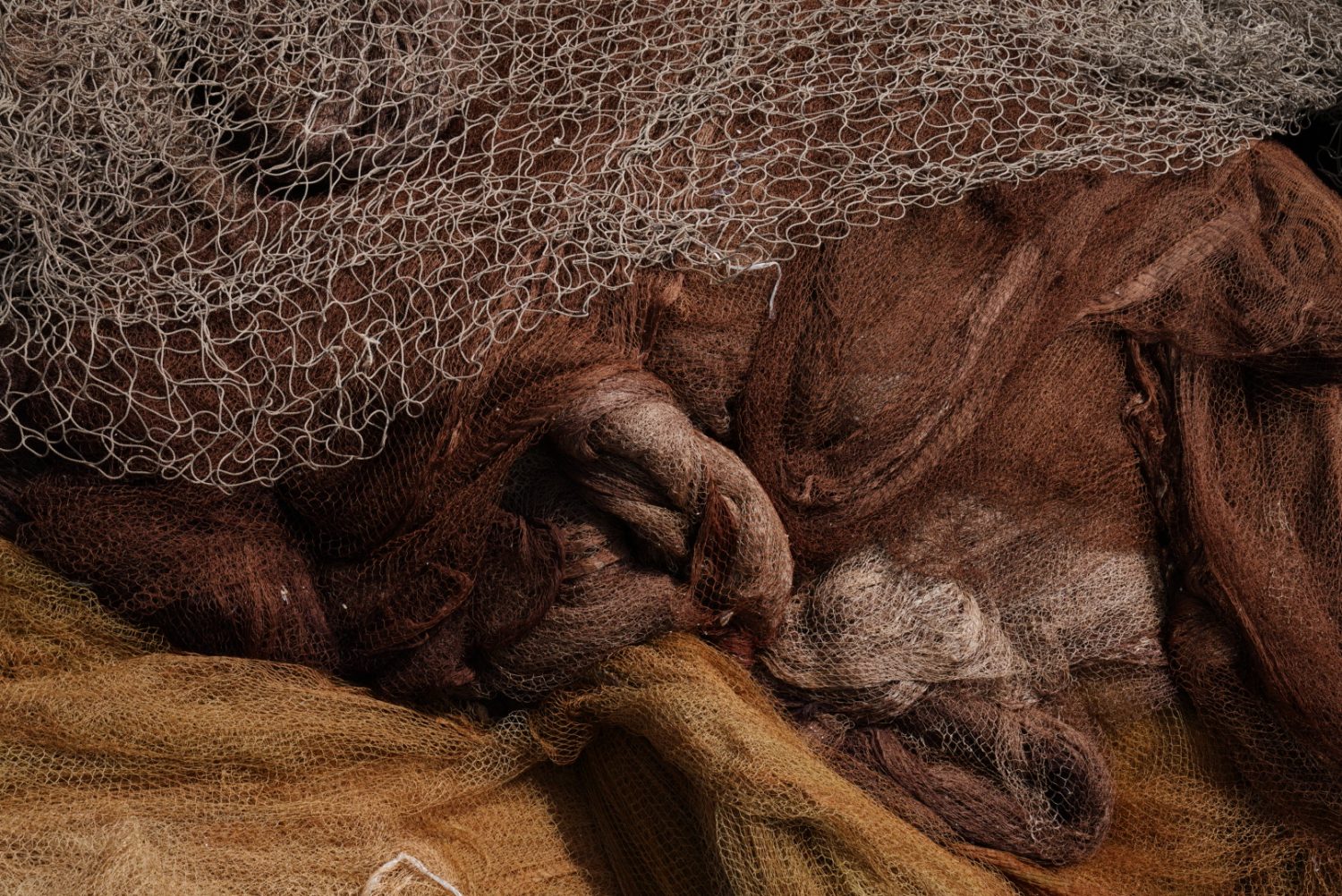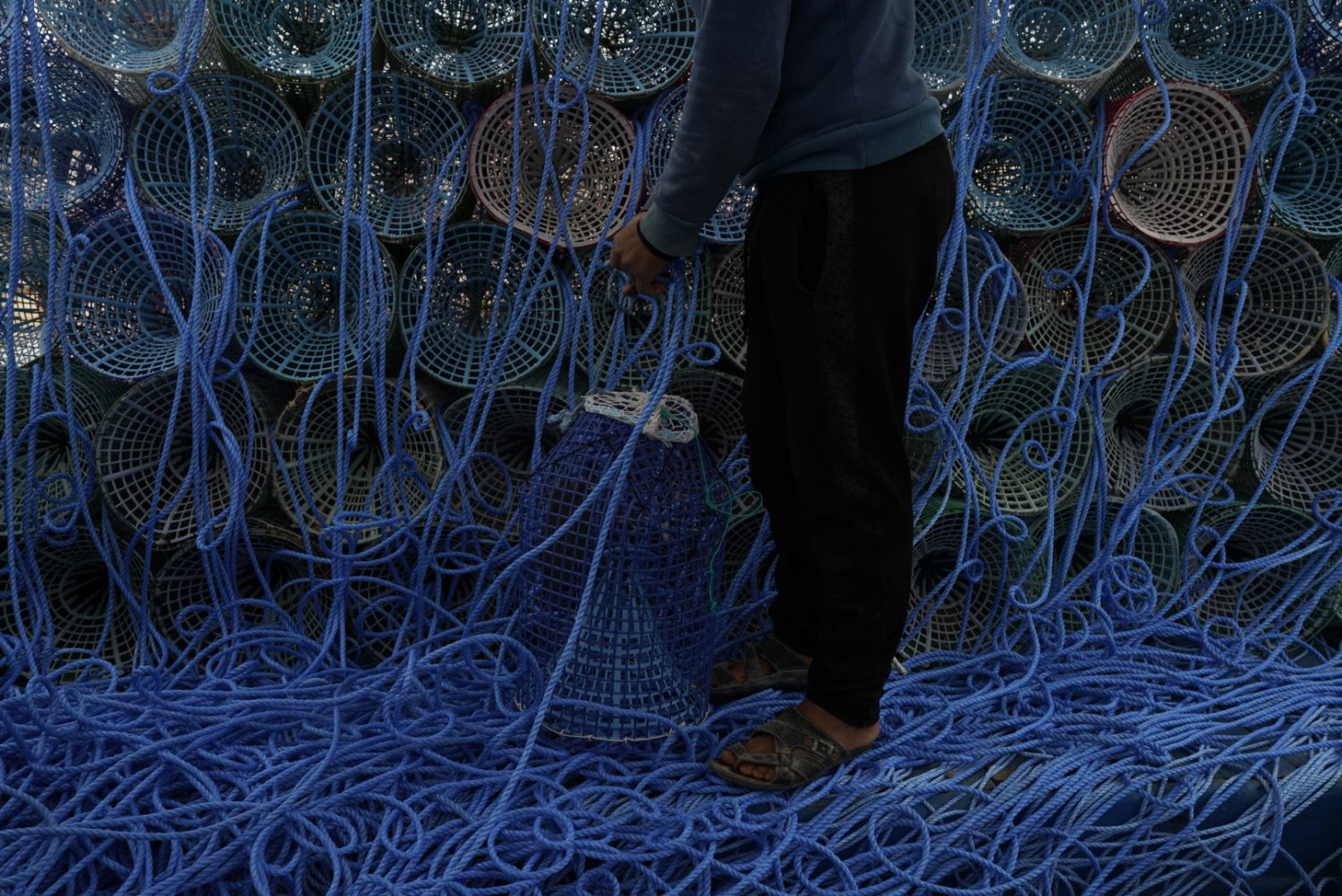Pray for Seamen is an artistic research project by Francesco Bellina and Stefano Liberti curated by Izabela Moren (Fondazione Studio Rizoma) narrating the situation of the seas, the ports, and the small-scale fisheries in Tunisia, Ghana, and Sicily through encounters with fishermen on the ground conducted in 2022. The extracts below are Stefano Liberti’s three short essays that originally appeared in a book of the same title published by Cesura Publish


Isole Kerkennah – Tunisia
Ramdhane Megdiche looks out at the sea that gave him everything. And then took everything away. His face is weather-beaten, his beard thick and grey, his hair tousled. Behind the web of wrinkles around his dark eyes, his gaze is bright and lively. Every so often, as he speaks, he breaks out into nervous laughter, trying to hide the sadness hanging over him like a shadow. Megdiche is sixty-one years old, the proud son of the island’s first fisherwoman, the venerated Saida Delali. A retired fisherman himself, Megdiche is father to a son who crossed the sea to reach Europe. There, he lives on the social margins of some French town. Megdiche’s father forced him to begin fishing when he was twelve years old. A century later, he still feels a mixture of resentment and anger for having been compelled to become a fisherman when, as a model student, he would have liked to continue his studies. Instead, he led the life others had chosen for him. That was the custom at the time: after primary school, people went to sea to continue their family’s destiny. That lineage ended with his generation; the following ones wanted nothing more to do with a profession that carried so much hard work for so little money. Instead, they seek fame and fortune across the sea.
The sea is everywhere here, in this piece of earth called Chergui, the main island of the Kerkennah archipelago. Only two of the dozen islets here are inhabited: Chergui and Garbi. Named after their positions – east and west respectively – they index the common sense of a community for whom orientation is everything, or almost. Here everyone is a fisherman; they always have been. There are no other professions. If you want to do something else, you have to take the ferry which, ten times a day, connects the western island with Sfax, on the Tunisian coast. Or follow in the footsteps of Ramdhane: become a harraga, burn your papers, board a small boat and aim for Lampedusa, only 120 kilometres away.
Jamestown, Accra, Ghana
“Progress” is the Chinese port being built near Jamestown. In order for the building site to be established, the artisanal fishermen had to be displaced, their homes razed to the ground. They were told that they, too, would benefit from the new port, and this fed their illusions. It was a false promise, because the project was explicitly imagined as infrastructure for industrial fisheries: there are storage warehouses, processing plants, and export facilities. The development marks the end of an era. And it accelerates the dissolution of the universe of artisanal fisheries.
The two models seem to be inherently irreconcilable. It is not so much the coexistence of different kinds of boats that determines that incompatibility, that could be managed, since in theory, industrial fishing boats cannot sail within 12 nautical miles of the shoreline and there are fishing zones reserved exclusively for artisanal fishing. Large fishing boats and artisanal fishers are authorized to capture different species of fish. The problem is, however, conceptual: the two forms of fishing are tied to two different ways of experiencing and living with the sea. For artisanal fishermen, the ocean gives, and it takes away; it is prodigal when it wants, but it can also be ferocious. And so it must be respected, protected, and listened to. For the magnates of industrial fishing, however, the great sea is, instead, a mine from which to extract riches – ideally to take them elsewhere, where they will cost more. Winning means extracting the most; accumulating without end; exploiting with impunity. With its fiery power, the splendor of easy profit, the blinding illusion of rapid enrichment, the industrial model has ended up contaminating artisanal fishermen’s ways of working, thinking and living with the sea. It has managed to corrupt a vision of the world, a way of acting in it, a form of collective feeling. And so the artisanal fishers became, in their turn, the assassins of the sea and, in the last instance, of themselves.
Trapani – Sicily
Trapani’s crisis is also the crisis of that vast space called the Mediterranean, which has lost its maritime vocation of encounters and conflicts, of trade and war, of profitable exchanges and Homeric plunder. The meeting place of pirates and buccaneers, merchants and cheats, coral fishers and tuna harpooners, that sea is now a shadow of its former self. And Trapani, the node of convergence of multiple borders, suspended between land and sea and forever in limbo between Europe and Africa, has lost its centrality.
Is it truly all lost? Is it possible to imagine a renewed pact between Trapani and her sea, which has for centuries been a source of life and wealth, an integral and fundamental part of the community? A renewal plan promoted by the Sicilian regional administration and financed by the National Recovery and Resilience Plan (PNNR) envisions the transformation of the Colombaia into an events and exhibitions space. Another, more ambitious, project aims to give new life to the seaside esplanade which is now in disrepair, rehabilitating the touristic port and the fishing docks.
Will these projects ever come to life? Will Trapani be able to turn its decline around and recover its past glory? In a garage just behind the port, an old man is busy mending his fishing nets. He is seated on a stool, alone. He holds a needle and thread in his hand. His work proceeds slowly, because his eyesight has been failing him for a while. But he is there, at sunset, busy with this activity against all apparent logic. It’s likely that no one will ever use those nets and it is possible that not even the fishermen themselves know that he is working for them. His seems to be weaving a textile in anticipation of better times. Like Penelope with brave Ulysses, the old former fisherman seems to be awaiting the return of the world that he knew and of which he himself, with his painstaking labor, has remained one of the last vestiges.
Pray for Seamen is an artistic research project by Francesco Bellina and Stefano Liberti that chronicles the situation of the seas, ports and small-scale fisheries in Tunisia, Ghana and Sicily through encounters with fishermen on the ground made in 2022. The project is the winner of the 10th Italian Council of the Ministry of Cultural Heritage. Produced by Fondazione Studio Rizoma, the final work will be donated to the Mare Memoria Viva Ecomuseum in Palermo.
Francesco Bellina (Trapani, 1989) is a documentary photographer living in Palermo. His artistic research focuses on contemporary socio-political instances with a particular focus on the theme of migration.
Stefano Liberti is an Italian journalist. His latest book is “Scorched Earth. How the environmental crisis is changing Italy and our lives (Rizzoli, 2021). Together with Enrico Parenti, he directed the documentary “Soyalism” (2018).
Artist: Francesco Bellina / Texts and interviews: Stefano Liberti / Curatorship and Project Design and curation: Izabela Anna Moren / Assistant Cinematographer: Giuseppe Scianna / Video: Umberto Santoro / Production Manager: Giorgio Mega / Art Direction and Exhibition Design: Studio Forward / Publisher: Cesura Publish